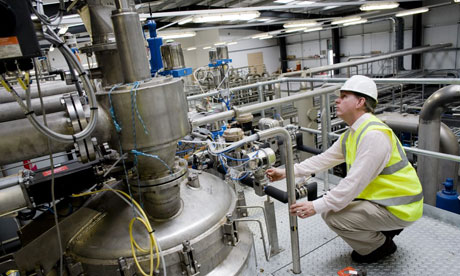Sep
23
Up Rating Corn Ethanol Production
September 23, 2009 | 2 Comments
A British company has found and bred a compost bacterium that may be coming to the U.S. corn ethanol industry. Chief executive officer Hamish Curran of TMO Renewables Ltd. said in an interview with Reuters on September 15th 2009, “The application of our technology results in the greening of corn ethanol.”
Curran said the TMO technology uses the main by-product of the U.S. corn ethanol industry, called distillers’ grains (DDGS), and converts it in part into additional ethanol and boosting production levels by about 15 percent.
TMO provides an industrial unit, or plug-in, which can be attached to a biofuel plant to boost output by recycling a by-product of the initial fuel run. Curran says if the US ethanol industry uses the plug-in from TMO, corn ethanol becomes an advanced biofuel, referring to the biofuel class that provides a savings of at least 50 percent in greenhouse gas emissions compared with mineral petroleum.
The TMO process is a new industrial process built around common bacteria developed from a strain found in compost heaps which can be retro-fitted to U.S. corn ethanol plants. The new process uses the DDGS while still wet, allowing substantial energy savings as well as the additional output, said to raise profit margins by 50 to 60 percent.
Curran said 25 owners of U.S. ethanol plants had expressed interest in the process and full-scale industrial trials have been conducted for four of them at the company’s demonstration plant in Dunsfold Park, just south of London, UK. TMO is working with ethanol producers to secure federal and state grants as well as loan guarantees for the plug-ins. “That is quite a lengthy process. Sometime in the next few months we will see a closure (deal concluded), I expect, and then the build time is between 12 and 18 months,” Curran said.
The TMO process exploits two innate properties of their unique bacterium to deliver a process for the highly efficient production of ethanol from a wide range of cellulose-rich biomass feedstocks. By exploiting the high temperature that the organism favors, fermentation can be performed at temperatures in excess of 60º C. This brings a number of benefits.
As very little added cooling or heating is required, there is a significant savings in energy. The heat-loving bacteria grow and produce ethanol very rapidly, they are able to continue at this higher temperature and the result, the intermediate product passes on to the purification steps without the need for any additional input of energy.
The bacteria have a preference for consuming the longer chain sugars that derive from the breakup of biomass. This brings a very significant benefit in that a very large portion of the work and cost required to break down biomass to simple sugars, such as glucose, is removed. The TMO fermentation process simply makes ethanol from a starting point higher up the carbohydrate chain.
Combining an appetite for complex sugars, the speed at which the bacteria works and the higher temperature of the process, forms a more cost effective process. By changing the starting point for the fermentation of ethanol, the methods of feedstock preparation, pre-treatment and sugar release are all simplified. This introduces a new economic point where the new process becomes viable.
The speed of the fermentation is rapid so the plant’s processing vessels can be reduced in size, driving down capital costs. In fact, almost all of the components at TMO’s demonstration plant are ‘off-the-shelf’ items of equipment, common in many chemical processes. The pre-treatment conditions are less severe than are required by the conventional route to ethanol from cellulose so the materials used in construction are significantly cheaper. The whole process is precisely what TMO is demonstrating at its Process Demonstration Unit (PDU) in Surrey, UK.
The PDU is an impressive multi-feedstock facility that demonstrates the TMO process on an industrial scale. The unit provides clients with the opportunity to have their own particular biomass feedstock processed into ethanol and co-products. This enables client prospects to make rapid and accurate assessments.
The bacterium discovery was from a screening process involving thousands of candidate organisms. TMO’s methodology was applied to a wild type bacterium isolated from a compost heap that’s of a family of micro-organisms which are prevalent throughout nature. The single-cell geobacillus bacterium had an innate ability to feed from and grow on a very wide range of carbohydrate substrates. In its wild form, it produced a substantial amount of lactic acid as a bi-product of its process. First by of turning the carbohydrate or biomass into sugar and secondly, absorbing that sugar into the cell and growing.
TMO both altered and controlled the internal metabolism of the bacterium to eliminate the production of lactic acid. That gave the organism the opportunity to produce increased amounts of other organic acids, such as acetic acid, but more particularly it conferred the ability to produce ethanol.
A second effort to alter the bacterium resulted in a further intermediate bacteria with a substantially increased metabolic rate. The discovery at Strain TM242 is a process bacteria development with the desirable bi-product of producing ethanol with no propensity to make unwanted side products and capable of growing very quickly on a wide range of substrates.
That might be the home run for both the UK’s TMO and the US ethanol industry.
Comments
2 Comments so far



Good Afternoon!!! newenergyandfuel.com is one of the most outstanding innovative websites of its kind. I enjoy reading it every day. Keep it that way.
this post is very usefull thx!